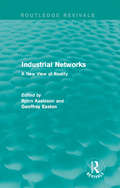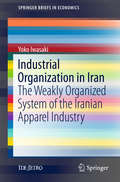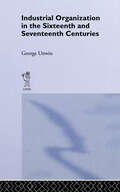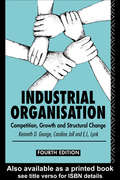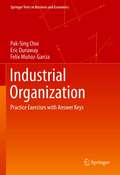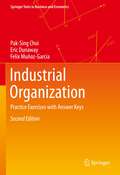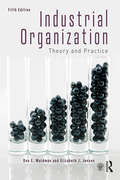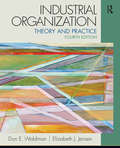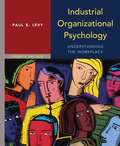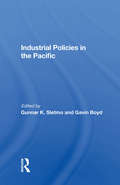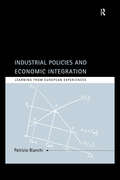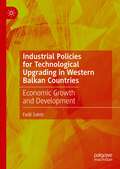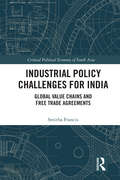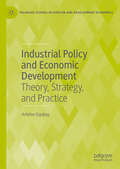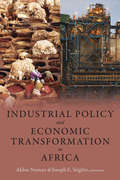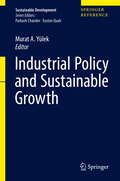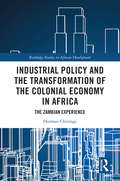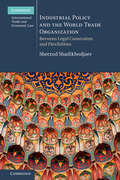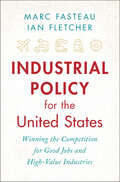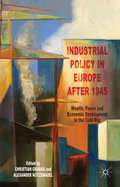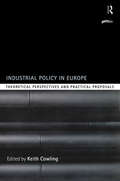- Table View
- List View
Industrial Networks (Routledge Revivals): A New View of Reality
by Björn Axelsson Geoffrey EastonFirst published in 1992, this volume brings together contemporary studies and reviews the research which established the study of networks as an area in its own right. By looking at the foundations of industrial networks and analysing network methodology and modelling, this book offers an integrated and coherent approach to the whole area. Covering small group analysis, network change processes and implications for business strategy, and presenting new ways to exploit inter-organisational relationships in the face of change, it tackles key issues with important implications for the future. This book will be of interest to students of economics and business.
Industrial Organization
by Paul Belleflamme Martin PeitzDigital technology has dramatically changed the structure of many industrial sectors. The rise of the Internet and increased broadband access have given rise to new business models andstrategies for firms dealing with both electronic and physical goods. Industrial Organization andthe Digital Economy focuses on changes in the two industries most affected by the new technology:software and music. The book offers the theoretical and factual grounding necessary forunderstanding the changes in industrial organization brought about by the digital economy, with thechapters together providing an accessible and interesting cross-fertilization of fact and theory. Moreover, two chapters demonstrate the relevance of the emerging literature on two-sided markets forthe digital economy. The contributors consider such topics as the innovation value of software;empirical evidence and theoretical analysis regarding the impact of file sharing on music sales; theability of firms to modify their products and offer them in different versions; the practice ofpreannouncing information goods; the effects of electronic commerce on both consumers and retailers;and price-setting by electronic mediators. The studies in Industrial Organization and the DigitalEconomy provide a valuable starting point for future research on other aspects of the subject,including the open-source movement and trust and reputation. Contributors:Paul Belleflamme, Jay PilChoi, Emin M. Dinlersoz, David S. Evans, Chaim Fershtman, Neil Gandal, Amit Gayer, Andrei Hagiu,Gerhard Illing, Bruno Jullien, Eirik Gaard Kristiansen, Stan J. Liebowitz, Jae Nahm, Martin Peitz,Pedro Pereira, Richard Schmalensee, Oz Shy, Patrick Waelbroeck
Industrial Organization in Iran
by Yoko IwasakiThis book focuses on Iran to explore the question of how the nature of industrial organizations and the whole system they constitute can exert a great influence on an industry's competitiveness and resilience. The author examines what happens if firms and companies participating in the manufacturing and distribution process of a certain product are not organized to a high degree and operate independently. The book begins with an inquiry into the historical environment of Iran's apparel industry, which has never been stable. It then reveals the specific practices that enable firms to maintain their independent business, and argues that the elastic state of the production and distribution system has worked for the survival of self-reliant member firms. The typical Iranian apparel firm persists in maintaining independent operations regardless of its size, a practice that is inimical to the development of long-lasting business relations with other firms as well as to vertical integration between firms, in all stages from production to distribution. A distinguishing feature of Iran's apparel industry is that the member firms are barely organized compared with their counterparts in advanced industrialized countries. Despite such a weakly organized system, generally small-scale but self-reliant Iranian firms courageously persist in the face of the market's difficulties. Superficially, it appears that Iran's apparel market is being filled with Chinese goods, but the reality is somewhat different. Apparel firms that are currently doing business with China but are ready to terminate it at any time are taking advantage of newly emerging opportunities to ensure the survival of their own businesses. Reopening those businesses for domestic operations remains an ever-present possibility for them.
Industrial Organization in the Sixteenth and Seventeenth Centuries: Unwin, G. (Routledge Revivals Ser.)
by George UnwinFirst Published in 1963. Routledge is an imprint of Taylor & Francis, an informa company.
Industrial Organization: Competition, Growth and Structural Change
by Kenneth George Caroline Joll E L LynkAs most economies remain caught in a global recession, that shows little sign of abatement, the importance of maintaining a flourishing industrial sector for the economic wellbeing of a country has rarely been so relevant.Industrial Organisation has long served as a basic introduction to this subject. The book is concerned with economic problems and policy issues that arise from the activities of firms. The authors reject the traditional micro-economic analysis of market structure in favour of studying conduct and performance in the context of macro-economic policy and the environment which this provides for firms.Substantially revised and updated to take account of developments in the subject since the publication of the last edition, Industrial Organization includes four new chapters which reflect the major new areas of interest in industrial economics over the last decade. These include the increasing importance of the service sector and problems of relatively low productivity growth within this, and questions relating to increased levels of international competition in a more open world economy. This is a comparative study, drawing on empirical evidence from the UK, USA and the EC. Mathematical and econometric requirements are kept to a minimum, and the text has long been regarded as the most accessible introduction to the subject.
Industrial Organization: Minds, Bodies, and Epidemics
by Li Way LeeThis book takes the reader on a new tour of the world of firms. We start with a visit to the inside of a firm. We meet the owner and the manager. We look deeply into their mindsets. Then we move outside the firm, to observe the firm's outer features. We pay particular attention to its size, its complexity, its fragility, and its similarity to other firms. In the second half of the tour, we visit communities of firms. We watch waves of mergers, chaos, and bubbles. Before returning, we witness battles between firms and creatures that act like antibodies in our blood: corporate raiders, antitrust agencies, and creative destructors. Throughout the tour, we ask how the things we see are linked. This book encourages the reader to see them as feedback loops. The book’s overarching argument is the importance of the separation of ownership and control and how society must pay more attention to the concept..
Industrial Organization: Practice Exercises with Answer Keys (Springer Texts in Business and Economics)
by Pak-Sing Choi Eric Dunaway Felix Muñoz-GarciaThis textbook presents 122 exercises on industrial organization with detailed answer keys. While most textbooks on industrial organization focus on theory and empirical findings, this textbook offers practical examples and exercises helping predict firm behaviour in different industries. The book emphasizes the game-theoretic tools used in each type of exercise, so students can systematically apply them to other markets, forms of competition, or information environments where firms, consumers, and regulating agencies interact. The book begins with examples that analyse different models of firm behavior and interaction; starting with monopoly and moving through the Cournot model of simultaneous quantity competition, the Bertrand model simultaneous price competition, and sequential competition. The following chapters apply game-theoretic tools to situations of increasing complexity: regulation; R&D incentives; mergers and collusion; bundling incentives; incomplete information, signalling, and competition; networks and switching costs. In addition to providing algebraic simplifications, some chapters also offer the unique feature of worked exercises based on published journal articles by leading scholars in the field. Finally, exercises are ranked according to their difficulty, with a letter (A-C) next to the exercise number, which allows students to pace their studies and instructors to structure their classes accordingly. Providing a rigorous, yet practical introduction to the field of industrial organization, this textbook is appropriate for advanced undergraduate and graduate students in economics and finance.
Industrial Organization: Practice Exercises with Answer Keys (Springer Texts in Business and Economics)
by Pak-Sing Choi Eric Dunaway Felix Muñoz-GarciaRevised and updated for the second edition, this textbook presents over 100 exercises on industrial organization with detailed answer keys. While most textbooks on industrial organization focus on theory and empirical findings, this textbook offers practical examples and exercises helping predict firm behavior in different industries. The book emphasizes the game-theoretic tools used in each type of exercise, so students can systematically apply them to other markets, forms of competition, or information environments where firms, consumers, and regulating agencies interact. The book begins with examples that analyze different models of firm behavior and interaction; starting with monopoly and moving through the Cournot model of simultaneous quantity competition, the Bertrand model simultaneous price competition, and sequential competition. The following chapters apply game-theoretic tools to situations of increasing complexity: regulation; R&D incentives; mergers and collusion; bundling incentives; incomplete information, signaling, and competition; networks and switching costs. In addition to providing algebraic simplifications, some chapters also offer the unique feature of worked exercises based on published journal articles by leading scholars in the field. Finally, exercises are ranked according to their difficulty, with a letter (A-C) next to the exercise number, which allows students to pace their studies and instructors to structure their classes accordingly. The second edition contains additional exercises optimized for study at the upper undergraduate level. Providing a rigorous, yet practical introduction to the field of industrial organization, this textbook is appropriate for advanced undergraduate and graduate students in economics and finance.
Industrial Organization: Theory and Practice
by Don E. Waldman Elizabeth J. JensenIndustrial Organization: Theory and Practice blends a rigorous theoretical introduction to industrial organization with empirical data, real-world applications and case studies. The book also supports students with a range of problems and exercises, and definitions of key terms and concepts. This balanced approach, which enables students to apply theoretical tools, has earned this book its ranking as one of the leading undergraduate texts in its field. For the fifth edition, relevant data, tables, empirical examples and case studies have been updated to reflect current trends and topics, in the most complete reorganization since the second edition. Further changes include: all public policy topics have been placed in the last section, making it simpler to use for courses that emphasize theory or public policy; an entirely new chapter on international trade and industrial organization; a new chapter on mergers; a separate section on antitrust; a companion website with PowerPoint slides and other supplements. This comprehensive book bridges the gap between economic theory and real-world case studies in an accessible, logical manner, making it the ideal undergraduate text for courses on industrial organization.
Industrial Organization: Theory and Practice (4th Edition)
by Don E. Waldman Elizabeth J. JensenWritten solely for the undergraduate audience, Industrial Organization: Theory and Practice, which features early coverage of Antitrust, punctuates its modern introduction to industrial organization with relevant empirical data and case studies to show students how to apply theoretical tools.
Industrial Organizational Psychology: Understanding the Workplace (Fourth Edition)
by Paul LevyThe new fourth edition introduces students to the psychological factors active in the workplace, including the psychology of the workforce, employee health and well-being, and various dynamics of work interaction. It includes recent studies focusing on new technologies, new work habits, and newly emergent organizational structures.
Industrial Policies In The Pacific
by Gunnar K. Sletmo Gavin BoydIn GATT negotiations over the past several years the United States, a founding member of the Asia Pacific Economic Cooperation Forum, has been pushing hard for a global liberalization of trade in services. This development would have special significance for the Pacific because of the intensifying competition between the United States and Japan for market shares. A comprehensive analysis of the service sector's role in that dynamic region is offered in this timely volume. Leading experts explore how service enterprises have affected trade in goods and transnational manufacturing, forming a regional pattern of interdependence. The authors assess each service sector from a regional perspective and offer detailed individual country studies as well. The concluding chapters provide a broad overview of corporate strategies, discuss questions of regional cooperation, and identify opportunities for new regional service enterprises.
Industrial Policies and Economic Integration: Learning From European Experiences (Industrial Economic Strategies For Europe Ser.)
by Patrizio BianchiThis volume examines what industrial policies are, and what role they play in the context of European integration. It provides a clear analysis of the process of integration from the Treaty of Rome to the Maastricht Treaty and beyond. Key issues covered include: * the theory of economic integration * policies to create a single market * the role of European Community institutions * policies to guarantee and promote market competition * policies of industrial development and innovation Industrial Policies of Economic Integration develops a new range of policies, aimed at allowing a new common market to enter the global marketplace effectively.This volume will be essential reading for students of European economics and policy makers interested in economic integration.
Industrial Policies for Technological Upgrading in Western Balkan Countries: Economic Growth and Development
by Fadil SahitiThis book focuses on Albania, North Macedonia and Kosovo; it explores the industrial policies currently in place in these economies and compares their effects with the situation in Slovenia, which is used as a reference country. It provides a brief introduction to some new industrial policy approaches and proposes a new industrial policy framework that focuses on development of the national innovation system through technology upgrading and increased exploitation of technology to build the foundations for sustainable development. Finally, it provides an empirical analysis of the technological capabilities of the manufacturing firms operating in in Albania, North Macedonia and Kosovo.It delves into the technical-economic properties of these Western Balkans countries and identifies some strategic options for industrial policy. It emphasizes the need for a form of governance that emphasizes on industrial development and innovation capabilities, which are required for the implementation of these new industrial policies. The analysis draws on the current industrial policy literature and work on developing (catch-up) economies, technological upgrading and innovation studies, which represent current academic thinking in these fields.
Industrial Policy Challenges for India: Global Value Chains and Free Trade Agreements (Critical Political Economy of South Asia)
by Smitha FrancisThis book looks at the debates on global value chains (GVCs) and free trade agreements (FTAs) as springboards for industrial development in developing countries, especially India. It connects the outcomes in GVC-led industrial restructuring and upgrading to industrial policy choices in trade and FDI liberalisation, in particular those through FTAs. With the share of manufacturing in GDP stagnant at around 15–16% since the 1980s, India’s policymakers have pinned their hopes on greater integration into GVCs to revitalise the manufacturing sector. The multiple FTAs the country has signed over the last few years, specifically the ones with the Association of Southeast Asian Nations (ASEAN), South Korea, Malaysia and Japan have been sought to be rationalised using the same argument. The book argues that failing to factor in the industrial policy causalities involved in sustainable indigenous technology development, structural barriers to the entry into GVCs, the assessments of the available evidence on the adverse impact of trade and FDI liberalisation as well as existing FTAs on firm-level incentives for undertaking domestic production, and the industrial policy constraints imposed by FTAs can prove costly for the trajectories of developing country economies, including India. Rich in data, this book will be useful to scholars and researchers of development economics, economics in general, development studies and public policy as well as government bodies, industry experts and policymakers.
Industrial Policy and Economic Development: Theory, Strategy, and Practice (Palgrave Studies in African and Development Economics)
by Arkebe OqubayThis book explores industrial policy and how it can drive economic development within emerging and developing countries. It examines the potential for sustainable economic growth and green industrialisation to deliver economic transformation and catch-up. The ways in which manufacturing can accelerate decarbonisation through the development of low-carbon industrial hubs, promote the expansion of renewable energy, and encourage investment in green technology and innovation are highlighted to show how industrial policy is key to achieving the net zero goals, the 2030 Agenda, and the Sustainable Development Goals. The links between industrial policy and urban transformation are also discussed to underline how cities can drive economic growth and foster technological innovation within the developing world. This book offers a framework for industrial policy and economic development that can be applied within emerging and developing economies, particularly in Africa. It will be relevant to students, researchers, and policymakers interested in development economics, industrial policy, and environmental economics.
Industrial Policy and Economic Transformation in Africa
by Joseph E. Stiglitz Akbar NomanThe revival of economic growth in Sub-Saharan Africa is all the more welcome for having followed one of the worst economic disasters since the industrial revolution. Six of the world's fastest growing economies in the 2000s were African. But with the exception of Ethiopia and Rwanda, the growth of these African nations was largely fueled by discoveries and the rising price of oil. Deindustrialization has yet to be reversed and structural transformation remains limited. This book explores the vital role that industrial policies can play in bringing about a transformation of African economies. Such policies pertain not just to industry. They traverse all economic sectors, including finance, information technology, and agriculture. More accurately understood as a package of learning, industrial, and technology (LIT) policies, they aim to bring vigorous and lasting growth to the region. This collection features case studies of LIT policies in action in many parts of the world, examining their risks and rewards and what they mean for Sub-Saharan Africa.
Industrial Policy and Economic Transformation in Africa (Initiative for Policy Dialogue at Columbia: Challenges in Development and Globalization)
by Stiglitz Joseph E. Noman AkbarThe revival of economic growth in Sub-Saharan Africa is all the more welcome for having followed one of the worst economic disasters—a quarter century of economic malaise for most of the region—since the industrial revolution. Six of the world's fastest-growing economies in the first decade of this century were African. Yet only in Ethiopia and Rwanda was growth not based on resources and the rising price of oil. Deindustrialization has yet to be reversed, and progress toward creating a modern economy remains limited.This book explores the vital role that active government policies can play in transforming African economies. Such policies pertain not just to industry. They traverse all economic sectors, including finance, information technology, and agriculture. These packages of learning, industrial, and technology (LIT) policies aim to bring vigorous and lasting growth to the region. This collection features case studies of LIT policies in action in many parts of the world, examining their risks and rewards and what they mean for Sub-Saharan Africa.
Industrial Policy and Sustainable Growth
by Murat A. YülekThis volume looks at the critical issues of industrial policy and sustainability. It assesses the gap between how developed and developing countries have integrated sustainability issues in their industrial policies, and how they should have ideally done so. The book looks at the specific issues of middle income trap, levels of industrialization and the distribution of manufacturing activities among nations, and presents analysis of sector and country specific policy case studies in areas such as health, energy, medical devices, aviation, automobile manufacturing. The volume also examines trade policies and their impact on industry and environment, and elaborate on how industrial policies involve selective direct and indirect sectoral policies which play a role in assisting policy makers manage objectives of catch up and sustainability.
Industrial Policy and the Transformation of the Colonial Economy in Africa: The Zambian Experience (Routledge Studies in African Development)
by Horman ChitongeIndustrial Policy and the Transformation of the Colonial Economy in Africa offers an in-depth analysis of the role industrial policy can play in the transformation of African economies. Using examples from Zambia’s industrial development experience, this book illustrates that core features of the colonial economy have not just survived six decades of independence in most African countries, but they have continued to shape the nature, scope and pace of economic activities on the continent. The book argues that since the colonial economy in Africa was not intended to serve the interests of Africans, it is imperative that the structures and the underlying rationale of the colonial economy are radically reoriented if economic activities in Africa are to benefit the majority of Africans. Drawing from the Zambian experience, the book shows that the transformation of the colonial economy in Africa is urgently needed. Whilst this has proved to be difficult over the past six decades, it can be done. The book outlines a specific type of industrial policy, Frontier Industrial Policy, as a key instrument for transforming the structure of African economies. At a time when economic growth across Africa is under considerable pressure due to COVID-19, the insights in this book will be of interest to researchers across Economics, Development, Postcolonial Studies, and African Studies.
Industrial Policy and the World Trade Organization: Between Legal Constraints and Flexibilities (Cambridge International Trade and Economic Law)
by Sherzod ShadikhodjaevThe severe global financial crisis of 2008 could not be overcome without government interventions through industrial policy. This timely book analyses industrial policy from the perspectives of trade law and economics under the WTO system. The author expertly examines both general tools of protecting and supporting domestic producers and specific topics like special economic zones, localization, greening measures and creative economy. In addition to legal texts and jurisprudence, this book extensively utilizes other WTO materials to show what is actually discussed in WTO meetings and forums on relevant issues. Where applicable, the author advances practical recommendations for 'right' or 'optimal' industrial policy in certain contexts based on trade rules, case law and some countries' real experiences. The author concludes this work with some thoughts on concrete actions to be taken at the WTO and national levels and in academic circles in order to better tackle industrial policy issues.
Industrial Policy for the United States: Winning the Competition for Good Jobs and High-Value Industries
by Marc Fasteau Ian FletcherThe U.S. is losing the competition for good jobs and high-value industries because most of Washington believes trade should be free, the dollar should float, and that innovation comes exclusively from the private sector. In this book, the authors make the bold case that these laissez-faire ideas have failed and that a robust industrial policy is the only way for America to remain prosperous and secure. Trump and Biden have enacted some of its elements, but it needs to be made systematic and comprehensive, including tariffs to protect key industries, a competitive exchange rate, and federal support for commercialization—not just invention—of new technologies. Timely, meticulously researched, and bipartisan, this impressive analysis replaces misunderstandings about industrial policy with lucid explanations of its underlying economic theory, the tools that implement it, and its successes (and failures) in America and abroad. It examines key industries of the past and future – steel, automobiles, television, semiconductors, space, aviation, robotics, and nanotechnology. It concludes with a realistic, actionable policy roadmap. A work of rigor and ambition, Industrial Policy for the United States is essential reading.
Industrial Policy in Europe after 1945
by Alexander Nützenadel Christian GrabasBringing together renowned scholars in the field with younger researchers, this interdisciplinary study of the history of post-war industrial policy in Europe investigates transfers across borders and locates industrial policy in the context of the Cold War from a global perspective.
Industrial Policy in Europe: Theoretical Perspectives and Practical Proposals (Routledge Series on Industrial Development Policy)
by Keith CowlingAfter a decade or more of privatisation and deregulation there is a growing consensus that government can have a positive role in promoting industrial development. This book explores a variety of ways in which this might be made to happen. A common theme is the need for participation at the appropriate level: too often industrial policy has been hampered by overcentralised decision-making. Containing contributions by some of Europe's leading industrial economists, Industrial Policy for Europe covers subjects from small business to macroeconomics.
Industrial Policy: The Coevolution of Public and Private Sources of Finance for Important Emerging and Evolving Technologies (Elements in Evolutionary Economics)
by Richard G. Lipsey Kenneth I. CarlawDismissing industrial policy because 'governments cannot pick winners' is counter-productive. This Element studying selected major innovations illustrates the fact that virtually all major new technologies have been developed by a synergetic cooperation between the public and the private sectors, each doing what it can do best. By examining how R&D is financed, rather than where it takes place, the authors show that the role of the public sector is much more pronounced than is often thought. The nature of the cooperation − who does what − varies with the nature of each innovation so that simple, one-size-fits-all, rules about what each sector should do are suspect. These results are particularly important because they challenge the scepticism in the United states and elsewhere about the importance of industrial policy, a scepticism that threatens to undermine the long-term, and necessary cooperation, between the public and private sectors in promoting growth-inducing innovations.
